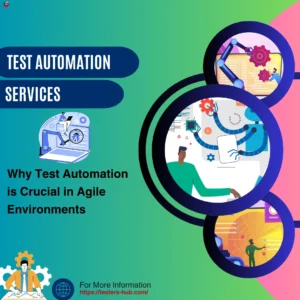Best Test Automation Services for Agile Projects in Healthcare
In today’s fast-paced software development landscape, particularly within agile frameworks, Test Automation services have become indispensable for ensuring the quality, security, and functionality of applications. This is especially true in industries like healthcare, where strict regulatory compliance, safeguarding sensitive data, and ensuring smooth functionality are critical. As agile methodologies push for rapid development cycles and frequent updates, traditional manual testing can no longer keep up with the demand for speed and scalability.
This article explores the growing importance of test automation services in agile projects, with a specific focus on how these services benefit the healthcare sector in the USA.

The Importance of Test Automation in Agile Projects
Why Test Automation is Crucial in Agile Environments
Agile development has transformed the software development process by emphasizing rapid, iterative releases. Teams work in short, focused cycles known as “sprints,” which allow for the quick rollout of new features and updates. This constant pace of change requires regular testing to ensure that new functionalities perform as expected, while also confirming that existing features remain intact.
Test automation is essential for keeping up with the speed of agile development. It allows for continuous testing, freeing teams from the repetitive tasks of manual testing and enabling them to focus more on building and improving features.
In industries like healthcare, where software must comply with strict regulatory standards and maintain high reliability, test automation helps maintain consistent quality assurance while also supporting the need for fast development cycles. By automating testing processes, teams can ensure high standards of quality without slowing down the development pace.
How Automation Testing Works in Agile Environments
In agile environments, test automation integrates seamlessly with Continuous Integration (CI) and Continuous Deployment (CD) pipelines. This integration allows teams to detect issues early in the development cycle, even before the product reaches production. Automated testing ensures that every new feature or fix adheres to functional requirements without introducing regressions.
Moreover, automation enables better collaboration between development, testing, and operations teams. It provides quicker feedback loops, ensuring that any bugs or defects are found and resolved swiftly.
Benefits of Test Automation in Healthcare Software Development
1. Compliance and Regulation Adherence
The healthcare industry is tightly regulated to ensure patient safety and data security. Healthcare software must adhere to various laws, such as HIPAA (Health Insurance Portability and Accountability Act) in the USA, which sets national standards for the protection of health information. By automating these checks, teams can proactively ensure that the software meets all necessary legal and regulatory requirements throughout its development cycle.
QA automation testing services are particularly beneficial in verifying that applications meet compliance requirements during every software update. Automated tests can be run at regular intervals, ensuring that even minor changes do not violate regulatory guidelines.
2. Faster Time-to-Market
In the fast-paced healthcare industry, the ability to quickly launch software is critical to staying competitive. Test automation helps speed up the quality assurance process, allowing healthcare providers to release new applications and updates more efficiently. Automated testing can be performed at any stage of development, delivering prompt feedback on new features or bug fixes.
By incorporating automated testing tools, healthcare organizations can accelerate the release of updates and new features, leading to improved operational performance and greater satisfaction among users.
3. Improved Software Quality
Manual testing is susceptible to errors, particularly when handling repetitive tasks such as regression testing. By automating these processes, healthcare organizations can guarantee consistent testing of software for functionality, security, and performance. Automated tests are executed in a standardized manner each time, ensuring dependable and accurate results. For healthcare applications, this consistency is essential to maintain the reliability of critical systems and ensure they continue to operate as intended.
4. Cost Efficiency
While the upfront costs of implementing test automation services may appear high, the long-term advantages make it a worthwhile investment. By automating routine testing tasks, healthcare organizations can cut down on labor expenses and minimize the time spent on manual testing efforts. Additionally, automated tests enable the evaluation of a wider range of scenarios and configurations in less time, helping to detect bugs earlier in the development process and reducing the need for expensive fixes after release.
Key Types of Automation Testing Services for Agile Healthcare Projects
QA Automation Testing Services
QA automation testing services thoroughly assess all essential aspects of software, including functionality, security, and performance. In agile development, these services play a vital role by enabling continuous testing throughout the development cycle. This ensures that new features and updates undergo consistent validation before integration, maintaining the integrity of the software throughout its evolution.
With the help of QA automation, healthcare teams can execute various types of tests, such as:
- Functional Testing: Verifying that the software operates according to its intended functions.
- Regression Testing: Ensuring that recent changes or updates do not negatively affect existing functionality.
- Security Testing: Ensuring the application meets industry security standards and safeguards sensitive patient information.
By utilizing QA automation testing services, healthcare organizations can minimize manual testing efforts, accelerate the testing process, and ensure a higher standard of software quality.
Software Automation Testing Services
Software automation testing services cover a broad range of testing needs, including performance, load, integration, and usability testing. These services are vital for healthcare applications that need to scale and function under various conditions, such as high traffic or limited resources.
Automating software testing services ensures that the application performs well under different conditions and meets the requirements for functionality, security, and performance. This is especially important in healthcare systems, where the reliability of software is critical to patient care.
Cypress Automation Testing Services
Cypress automation testing services are highly effective for testing modern web applications. This open-source, JavaScript-based framework automates testing for both the frontend and backend of web applications. Cypress is renowned for delivering fast, reliable results and providing real-time feedback during tests.
For healthcare organizations that rely on web applications for services like patient management or telemedicine, Cypress offers a robust testing solution. It ensures that web applications work smoothly across different browsers and devices. Additionally, Cypress easily integrates into CI/CD pipelines, making it an excellent choice for agile development processes in healthcare.
Selenium Automation Testing Services
Selenium automation testing services are commonly employed in agile software development to test web applications. This popular open-source framework supports a variety of programming languages such as Java, Python, and C#, making it versatile for automating both functional and regression testing. Selenium helps ensure that web applications run correctly across various browsers and platforms.
For healthcare organizations in the USA, Selenium provides an adaptable and reliable solution to maintain the quality of web-based applications. It helps ensure that critical healthcare applications remain stable and perform optimally, supporting essential functions like patient care and telemedicine.
Web Automation Testing Services
Healthcare organizations are increasingly relying on web applications to manage patient data, provide telehealth services, and support clinical decision-making. Web automation testing services ensure that these applications are reliable, secure, and user-friendly.
By automating web testing, healthcare providers can identify defects and improve the user experience. Automated tests can check for performance issues, cross-browser compatibility, and security vulnerabilities, ensuring that applications function well for all users and remain secure against cyber threats.
Outsource Automation Testing Services
As agile development gains traction in healthcare, many organizations are opting to outsource automation testing services to optimize their workflows. By partnering with specialized testing providers, healthcare organizations can take advantage of expert knowledge, cutting-edge tools, and quicker testing cycles.
Outsourcing automation testing allows healthcare providers to concentrate on their primary focus areas, such as patient care and medical research, while relying on testing experts who have the skills and resources to conduct thorough and efficient assessments.
Best Practices for Implementing Test Automation in Agile Projects
1. Start Early in the Development Cycle
In agile environments, test automation should be integrated early in the development process. By starting automation testing from the first sprint, development teams can catch defects early, reducing the time and cost associated with fixing bugs later in the process.
2. Focus on Critical Test Cases
Not all test cases require automation. In agile projects, it’s important to identify the most critical tests, such as regression, security, and performance tests, and prioritize automating them. By automating these key test cases, teams ensure that the essential features receive thorough testing, without spending excessive time on less critical tests.
3. Maintain and Update Automated Tests
4. Collaborate Across Teams
Agile development relies on collaboration between development, testing, and operations teams. Test automation should be a collaborative effort, with all team members working together to ensure that the tests align with the software’s goals and requirements.
5. Select the Right Tools for the Job
Choosing the right automation testing tools is crucial to the success of the testing process. Whether you choose Selenium, Cypress or any other tool, make sure that it aligns with your project’s needs and integrates well with your development environment.
Conclusion
For healthcare organizations in the USA leveraging agile methodologies, test automation services are an essential part of the development lifecycle. From QA automation testing services to Selenium, Cypress, and web automation testing services, these tools help teams deliver high-quality software quickly and efficiently while ensuring compliance with regulatory requirements.
By adopting test automation services, healthcare companies can streamline their development processes, improve software quality, and ultimately deliver better services to their patients. Whether you choose to outsource automation testing services or build an in-house testing team, the benefits of automation in agile development cannot be overstated. The healthcare industry is evolving rapidly, and with the help of automation testing, organizations can stay ahead of the curve and provide the best possible care to their patients.










